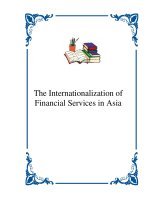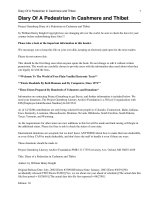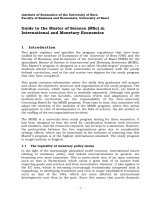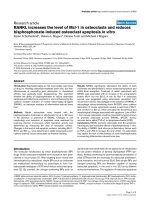explain differences of use of financial statements in accountancy and finance
Bạn đang xem bản rút gọn của tài liệu. Xem và tải ngay bản đầy đủ của tài liệu tại đây (423.9 KB, 21 trang )
Explain differences of use of financial statements
in accountancy and finance
GROUP 3 TON DUC THANG UNIVERSITY
Structure of presentation
•
Definition of Financial statements
o
Balance sheet
o
Income statement
o
Statement of retained earnings
o
Statement of cash flows
•
Differences of use of Financial statements in Accountancy vs Finance
Definition of Financial statements
Financial statement is a report that records the financial activities of a business, individuals or any other entity.
There are 4 basic statements:
Balance sheet
Income statement
Statement of Retained Earnings
Statement of Cash Flows
Balance sheet
Definition: a balance sheet or statement of financial position is a summary of the financial balances of
a sole proprietorship, a business partnership, a corporation or other business organization.
A balance sheet is often described
•
as a "snapshot of a company's financial condition".
•
the balance sheet is the only statement which applies to a single point in time.
Balance sheet
Assets = Equity + Liabilities
There are 3 elements in a balance sheet
•
Assets: tangible and intangible things that can be converted into cash.
•
Liabilities : Current liabilities and long-term liabilities, which are needed to raise capital
investment.
•
Equity : Capital stocks, share premium, retained earnings, others,…which are the amount of
shareholders holding
The Balance sheet equation:
Assets = Liabilities + Stockholders’Equity
Income statement
•
Definition: An income statement (statement of income, statement of earnings, or statement of operations…) shows
the revenues and expenses of a company during the accounting period.
•
There are some elements:
Revenues: Cash and promises received from sale of goods or services to customer
Expenses: money used to earn revenues during period
Net income: is the excess of total revenues over total expenses
The Income Statement equation:
Net income=Total Revenues-Total Expenses
Statement of
Retained Earnings
•
Definition: a statement of retained earning shows how the net income and distribution of
dividends affected the financial position of a company during the accounting period.
The Statement of Retained Earning equation:
Ending RE = Beginning RE + Net Income-Dividends
Statement of Cash Flows
•
Definication: a2cash flow statement (or statement of cash flows)2shows:
how changes in2balance sheet2accounts
income affect2cash and cash equivalents
breaks the analysis down to operating, investing, and financing activities.
Operating activities
Investing activities
Financing activities
Statement of Cash Flows
3 Main categories
Operating activities
•
Operating activities
: includes net income, depreciation, changes in current assets and
liabilities other than cash, short-term investment, and short-term debt
=>shows how much cash comes from sales of the company's goods and services, less the
amount of cash needed to make and sell those goods and services
Investing activities
•
Investing activities: includes investments in or sales of fixed assets
⇒
this section largely reflects the amount of cash the company has spent on2capital
expenditures, such as new equipment or anything else that needed to keep the business
going.
⇒
It also includes acquisitions of other businesses and monetary investments such
as money market funds.2
Financing activities
•
Financing activities: includes raising cash by selling short-term investment or by issuing short-
term debt, or shock.
=> This section describes the goings-on of cash associated with outside financing activities.
•
Typical sources of cash inflow would be cash raised by selling stock and bonds or by bank
borrowings. Likewise, paying back a bank loan would show up as a use of cash flow, as
would2dividend payments
The Statement of Cash Flows equation:
+/- Cash Flows from Operating activities (CFO)
+/- Cash Flows from Investing activities (CFI)
+/- Cash Flows from Financing activities (CFF)
= Change in Cash
Relationship of Financial Statements
Differences of use of Financial statements in Accountancy vs
Finance
DIFFERENCES ACCOUNTANCY FINANCE
Primary function _Develop & provide data measuring the performance of firms
_Assess its financial position, and pay taxes.
_The accountant is responsible for preparing financial
statements such as the income statement, balance sheets, and
cash flows.
_It uses the financial statements prepared by accountants:
to make decisions about the firm’s financial condition
to advise others about possible losses and profits.
_Finance also deals a lot with risk.
_Derivative securities (options, futures, swaps, etc) are used to
hedge against possible increase in risk.
DIFFERENCES ACCOUNTANCY FINANCE
Purpose
Measuring, preparation, analyzing, and interpretation of financial
statements.
=> To collect and present financial information of a company
Making decision regarding working capital issues:
o
level of inventory
o
cash holding
o
credit levels
o
financial strategy
o
managing and controlling cash flow.
Goal
To see how the company is performing To forecast the future performance of the business
System of determination
of funds
(That is Income &
Expenditures)
Based on accrual system:
_Revenue is acknowledged at the point of sale and not when it was
collected. _Expenses are acknowledged when they are incurred than
when they are paid
Based on cash:
_Revenues are acknowledged during the actual receipt in cash as in
cash flow
_Expenses are acknowledged when the actual payment is made as in
cash outflow
DIFFERENCES ACCOUNTANCY FINANCE
Balance sheet is used to test, evaluate the accuracy of the accounts,
data recording, and the fluctuation of assets and capital.
Is used for decision of the company’s plant
Statement of Retained
Earnings
•
Only visible to the shareholders or those who want to
use the information in the financial statements
•
The income share that companies use to reinvest in
the core business of it
•
Provide for shareholders and those who want to use the
information in financial statements about the effectiveness of
using retained earnings by:
measuring return on investment
answer the question of whether the retained earnings to be
reinvested could help firm earn the return on investment or
whether the company could developed or not. If not, the
investors and shareholders may want to receive their dividends.
THE END !









